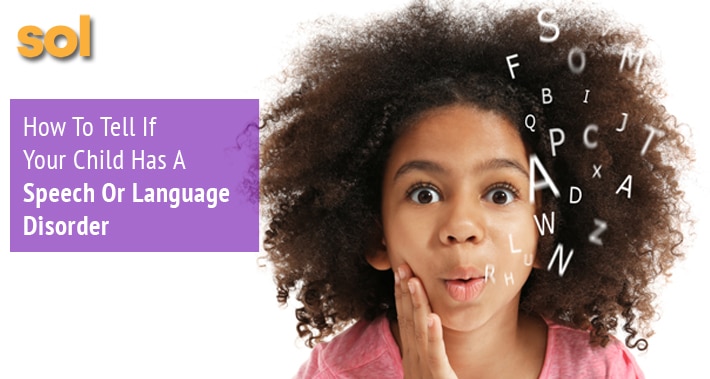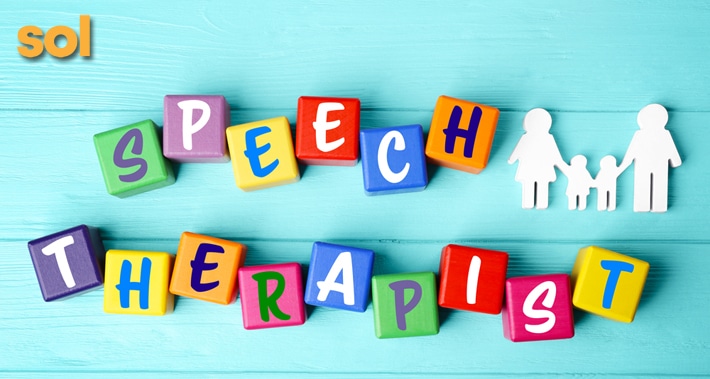
As a parent, you want the best for your child.
Chances are you’re watching them grow and develop very closely, and along the way you may wonder of their development is considered “normal” for their age, or if they may be experiencing delays.
One area which can be a cause of worry for parents, is if children don’t seem to be developing speech and language skills at a rate appropriate for their age.
You might compare their development to their siblings, or to the children of your friends and family members.
Ideally though, if you have a concern, you’ll want to consult the services of a pediatric speech therapist to determine if they are meeting milestones at an appropriate rate.
If your child doesn’t seem to be developing speech and language skills at the rate you think they should be, early intervention speech therapy can help them to get back on track.
Keep reading to learn more.
What Are the Symptoms Of A Speech Or Language Disorder
Speech and language are connected, and some of the signs your child may have a disorder in one of these areas include:
- Crying or having more tantrums than you may consider normal
- Not starting to speak at an appropriate age
- Having trouble following simple directions
Furthermore, some specific signs of a speech disorder can include:
- Hoarse or breathy sounding voice
- Voice sounding nasal
- At one to two years of age, incorrectly saying b, h, m, p, and w sounds
- At two to three years of age, producing speech which is difficult to discern/unclear – an early sign of needing speech therapy for speech sound disorders
- Also, at two to three years, saying sounds involving d, f, g, k, and n incorrectly
- Has difficultly saying sounds or words by 2.5 to three years of age
- In addition at 2.5 to three years, repeating first sounds of words – an early sign of needing speech therapy for stuttering
- Extending and stretching out words
- Pausing multiple times while speaking (2.5 to three years of age)
As well, some signs of a language disorder may include:
- Birth to three months: not interacting or smiling with other people – an early sign of needing speech therapy for autism spectrum disorder
- Four to seven months: not making babbling sounds
- Seven months to one year: Not using gestures
- Also, at seven to twelve months: Makes only a limited number of sounds – an early sign of needing speech therapy for childhood apraxia of speech
- Seven to 24 months: Not understanding what people around them are saying
- 12-18 months: Not saying many words
- Not beginning to form sentences by 1.5 to two years of age
- By two years of age, vocabulary is still less than 50 words
- Two to three years old, having difficulties playing with other children their age
- Reading and writing skills not developing by two to three years – a sign of needing speech therapy for dyslexia or other learning disabilities
Speech and language disorders are often signs of hearing loss, so if your child is unable to follow basic directions, doesn’t pay attention to sounds and noises, and doesn’t respond to their name these could also be signs of a hearing issue.

How Can A Speech Therapist Help?
If you are noticing signs of a speech or language disorder in your child, you’ll want to seek out the services of a speech therapist as soon as possible.
They will be able to perform a speech and language evaluation to understand the extent of your child’s speech or language issues and offer a plan in order to address them.
Will Your Child Grow Out Of It?
Many parents will notice issues related to speech and language in their children and decide to take the “wait and see” approach to see if they outgrow the issues over time.
This is especially true if their child’s development seems to be otherwise normal in other ways, such as motor skills and age appropriate play.
While in some cases this works, it’s not generally the best choice.
A speech therapist knows the milestones and ages at which they should be reached.
If your child isn’t reaching certain milestones by the appropriate ages, then early intervention is your best bet for handling these issues.
Let’s have a look at some of the benefits of early intervention.
1. Early Intervention May Eliminate Your Child’s Speech Or Language Disorder
It can be difficult to tell which children will be able to completely eliminate their speech and language issues.
However, you’re much more likely to obtain this outcome if you intervene early.
If the issue is with how your child articulates words, early intervention by a speech therapist can help to provide assessment and treatment for these issues.
Ultimately, taking action early is the best way to help your child catch up to their peers so they don’t get left behind when it comes time to start school.
2. Early Intervention Can Reduce Frustration
Trying to communicate with a child whose speech and language skills aren’t developing at the rate they should be can be extremely frustrating – both for you, and for your child.
Intervening early can help you and your child learn effective strategies to communicate – this is especially important for children who have difficulty with using verbal language.
Although early intervention may result in helping your child learn to speak, it can also mean learning to use signs or pictures to communicate with the world around them.
3. Early Intervention Can Improve Your Child’s Development
The first three years of life are incredibly important for the development of speech and language skills.
It’s important to intervene while the brain is still developing, to make the most of this period of development, where outside influences will have the greatest impact.
Book An Appointment With Sol Speech & Language Therapy Today
Are you worried about the rate at which your child’s speech is developing?
Do their language skills seem to be lacking?
At Sol Speech and Language Therapy we can help assess your child for speech and language disorders and provide early intervention and treatment for them.
Book Your Appointment with Sol Speech And Language Therapy today to get started.
6448 E Hwy 290 Suite E-108,
Austin, TX 78723
(512) 368-9488
» https://g.page/r/CfRfhOpEQm7BEAE
Sol Speech & Language Therapy
555 Round Rock W Dr E-221,
Round Rock, TX 78681
(512) 808-3953
» https://g.page/r/Cb5pwCTosSEfEBM
Sol Speech & Language Therapy offers personalized skilled intervention to those struggling with their speech and language skills. Services offered include screening, consultation, and comprehensive evaluation. We also provide one-on-one and/or group therapy for speech sound disorders, receptive/expressive language delay/disorder, stuttering/cluttering, accent reduction, and much more.